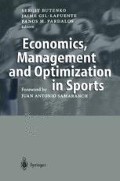Abstract
For many years, presidents and general managers of major football (soccer) clubs in Spain have been debating over how to assign referees for each match. When the responsible committee subjectively selected a referee, many people responsible for the “affected” teams had the right to complain about the always latent possibility that a certain amount of favoritism could occur for certain matches. While now, by using the famous “machine”1, the whims of randomness mean that certain matches that are considered important are not refereed by the most suitable referees.
Access this chapter
Tax calculation will be finalised at checkout
Purchases are for personal use only
Preview
Unable to display preview. Download preview PDF.
References
De Luca, A. and Termini, S.: “A definition nonprobabilistic entropy in the set-ting fuzzy sets theory” . Information and Control, 1972, 20, p.301–312.
Gil Aluja, J.: “Elements for a theory of decision in uncertainty”. Kluwer Aca-demic Publishers. Dortrech, 1999.
Gil Aluja, J.: “La Gestión Interactiva de los Recursos Humanos en la Incer-tidumbre” , CEURA, Madrid 1996, p. 170–172.
Gil Aluja, J.: “Selección de Personal. El problema de la polivalencia y el de la uniformida” . Note-books, CEURA. Madrid, 1987.
Gil Aluja, J.: “The interactive management of human resources in uncertainty”. Kluwer Academic Publishers. Dortrech, 1998.
Gil Aluja, J.: Elements for a theory of decision in uncertainty. Kluwer Academic Publishers. Dortrech, 1999.
Gil Lafuente, J.: “Algoritmos de la Excelencia. Claves para el Exit° en la Gestión Deportiva”. Publ.. Milladoiro, Publications of the Barcelona F.C., Vigo, 2002.
Gil Lafuente, J.: “El Mejor Sistema de Designación Arbitral: el Algoritmo Húngaro”. Actas del Congreso: “International Congress A.C.S.E.G.’2002”. Boulogne-Sur-Mer (France), 21and 22 , November, 2002, p. 167–180.
Gil Lafuente, J.: “La asignacióón de deportistas a los puestos de un equipo” . Proceedings of the: “VI S.I.G.E.F” Congress. Morelia, Michoacán (Mexico), 15, 16 and 17, November de 1999, D. 284–299.
Gil Lafuente, J.: “Les Universitats en el Centenari del Futbol Club Barcelona. Estudis en l’àmbit de l’esport”, (J. Gil Aluja Ed.): “L’optimització del fitxatge d’un esportista en l’ambit de l’esport” . Publications of the Barcelona F.C.. Publ. Milladoiro, Santiago de Compostela, 1999, p. 3–55.
Gil Lafuente, J.: “The adquisition of having inmobilized inmaterial in the sports societies”. Proceedings: “International MS’99 Congress”. Santiago de Compostela, 17, 18 and 19. May 1999, p. 185–196.
Gil Lafuente, J.: “Una Herramienta Optima de Designación Arbitral basada en las Lógicas Multivalentes: Hombre y Máquina”. Proceedings: “XI International Congress A.E.D.E.M.” . Paris (France), 2, 3 and 4, September 2002, p. 491–498.
Gil Lafuente, J: “El ‘Indice del Máximo y Mínimo Nivel’ en la Opti-mización del Fichaje de un Deportista”. Proceedings: “X International Congress A.E.D.E.M.”. Reggio Calabria (Italia), 4, 5 and 6.
Gil Lafuente, J: “Marketing para el nuevo Milenio. Nuevas tecnicas para la gestión comercial en la incertidumbre” . Publ Pirámide. Madrid, 1996.
Kaufmann, A. and Gil Aluja, J.: “Introducción a la teoría de los subconjuntos borrosos a la gestión de las empresas”. Publ. Milladoiro (3rd edition). Santiago de Compostela, 1993.
Kaufmann, A. and Gil Aluja, J.: “Tecnicas especiales para la gestión de exper-tos” . Publ. Milladoiro. Santiago de Compostela, 1993.
König, D.: “Theorie der endlichen und unendlichen graphen (1916), later reprinted by Chelsea Publ. CO, New York, 1950. This work was made known by Kuhn, H.W. in his article “The Hungarian Method for the Assignment Prob-lem” , Naval Research Quaterly, vol. 2, no 1–2 March-June 1955.
Zadeh, L.: “Fuzzy Sets. Information and control”. 8 July 1965, p. 338–353.
Zimmermann, H. J.: “Results of empirical studies in fuzzy sets theory”. In Klir, G. J.: “Applied General Systems Research. Plenum. New York, 1978, p.303–312.
Author information
Authors and Affiliations
Editor information
Editors and Affiliations
Rights and permissions
Copyright information
© 2004 Springer-Verlag Berlin Heidelberg
About this chapter
Cite this chapter
Lafuente, J.G. (2004). The Best Systems for Appointing Referees. In: Butenko, S., Gil-Lafuente, J., Pardalos, P.M. (eds) Economics, Management and Optimization in Sports. Springer, Berlin, Heidelberg. https://doi.org/10.1007/978-3-540-24734-0_7
Download citation
DOI: https://doi.org/10.1007/978-3-540-24734-0_7
Publisher Name: Springer, Berlin, Heidelberg
Print ISBN: 978-3-642-05849-3
Online ISBN: 978-3-540-24734-0
eBook Packages: Springer Book Archive

